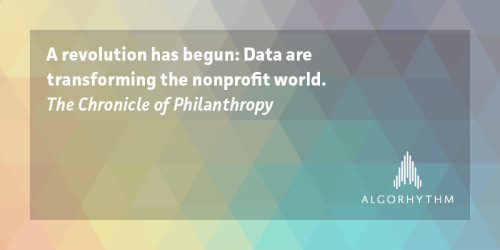Nicole Wallace wrote a terrific piece in The Chronicle of Philanthropy called Non-Profits Are Taking a Wide-Eyed Look at What Data Can Do. She features Algorhythm among other data experts. The premise of the piece is this: “A revolution has begun: Data are transforming the nonprofit world.” And we couldn’t agree more. “The new number crunching is fundamentally changing the way charities make decisions about programs, solicit contributions, and push for social change.
- The Indianapolis Museum of Art pores over attendance information and visitor surveys to determine everything from when it should be open to the best ways to spend scarce resources. The museum extended hours for its Matisse exhibit when data from previous high-profile shows predicted a surge visitors in the final weeks of the show. The change allowed more than 4,000 additional people to see the exhibit.
- The Humane Society of the United States, World Vision, and a growing number of other charities have added data analysts to their fundraising departments. One of the new hires’ most important tasks: creating detailed statistical pictures of the groups’ major donors and then scouring the organizations’ databases to find other supporters who fit those profiles. The goal: to help them focus attention on the people who are most likely to give.
- DonorsChoose, which helps teachers raise money for classroom projects and equipment, makes information about the projects funded on its crowdsourcing site available for policy makers, parents, and others to see, giving them a glimpse of what schools need money for.
Foundations are getting in on the action, too, with a handful making large grants for data projects. Last month, the John S. and James L. Knight Foundation awarded $2.2-million in grants for programs that use data to improve health and well-being, and the Bill & Melinda Gates Foundation awarded $600,000 in November for projects that combine multiple sets of data to help solve tough problems. Some data experts envision a not-too-distant future when charities can use the information they collect to home in on individuals in greatest need of assistance and tailor their approach to each one.” Nicole interviewed me for this story.
Pete York, founder of Algorhythm, a data-science consulting company, is working with the State of Florida to use sophisticated data-mining technology to identify juvenile offenders at greatest risk of committing another crime and determine the right mix of services to help each one overcome the odds. “There’s no such thing as one program that works for everybody,” said Mr. York.

